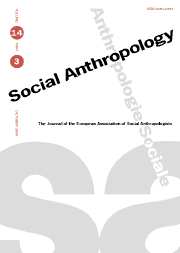No CrossRef data available.
Article contents
Micro-historical settings in an anthropological venture
Published online by Cambridge University Press: 01 February 1999
Abstract
Violence et vérités. Un royaume du Rajasthan face au pouvoir colonial. Par Denis Vidal. Paris: EHESS. 1995. 398 pp. 200 FF. ISBN 2 7132 10186.
Violence and truth. A Rajasthani kingdom confronts colonial authority. By Denis Vidal. Delhi: Oxford University Press. 1997. 258 pp. Rs 450. ISBN 0 19 564 105.
In this convincing and often elegant essay, Denis Vidal argues that the British colonial presence in India has not only imposed unprecedented perceptions of violence and order on Indian society, but also led to redefinitions of pre-existing forms of conflict and their reinterpretation, both at local and regional levels. To document these complex processes of interaction, the argument is based on an ethnohistorical recapturing of the little Rajasthani kingdom of Sirohi. Exploring the diverse forms of protest traditionally favoured by the different communities present within its administrative and political arena and considering each as representative of specific interests, the attempt is first to illustrate how threats of suicide and challenges of armed rebellion or mass migration constituted major traditional resources to implement the course of a social setting through a continuous flux of claims and tensions. These older modes of dissent, qualified by the colonial authorities as ‘impulsive’ and ‘criminal’, were considered mere symptoms of instability and disorder. They became modalities in the expression of discontent and the initiation of arbitration. In turn, they also became progressively discredited by those who were accustomed to resort to them when realising they could no longer induce the negotiations and debates they had opened in the past. This growing awareness caused them slowly to be replaced by different modes of protest more susceptible to be heard, and to meet the attention of the new powers they opposed, while initiating unprecedented forms of dialogue that could favour a compromising agreement to the involved parties after having, so to speak, established their divergent issues within compatible grounds of discursivity.
- Type
- Review Article
- Information
- Copyright
- © 1999 Cambridge University Press




